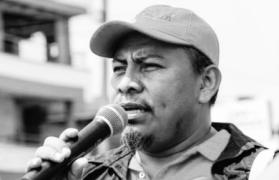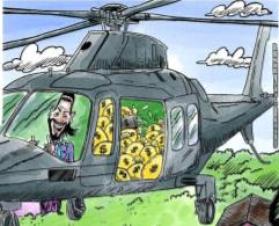New Minister Continues Misguided Iron-Fist Policies, Appoints Officials Investigated for Corruption in US-El Salvador Anti-Gang Unit
Following the controversial appointment at the end of last year of ex-General David Munguía Payés as Minister of Public Security, the new military officers in charge of Public Security have begun revealing the plans they promise will reduce the country´s murder rate by 30% in the next year. The central strategy is a declared “war on gangs,” focusing on repressive policies that, as history has demonstrated, only worsen crime. As part of the burgeoning security plans, the National Civilian Police (PNC) has formed a specialized Anti-Gang Unit, an elite subdivision of police agents with specialized training from the Salvadoran Armed Forces and US security advisors, whose central focus will be disrupting the structures and activities of gangs.
The new Minister of Security is also currently working with the Attorney General´s office and courts to form a “subsystem” of justice, called the Anti-Gang Intervention Group (GIAP), with specialized judges and prosecutors to handle all gang-related cases. Both the PNC´s Anti-Gang Unit and the GIAP will coordinate with the Transnational Anti-Gang Unit (TAG) which was formed by the United States and El Salvador in 2007 to share police information and combat the gangs that operate in both countries.
Until the recent public security shakeup, TAG was directed by Douglas Omar García Funes, known as the “Carabinero,” a reference to the police in Pinochet's Chile. García Funes, who was recently named as the PNC Chief of the Western Provinces, has been investigated by the PNC Inspector General, Zaira Navas, for “illicit enrichment” and negligence in failing to arrest notorious drug trafficker José Natividad Luna Pereira after INTERPOL issued an alert. In response to the accusations, he has said he didn't “necessarily” know of the alert. Pedro González, who is currently in charge of the PNC's Anti-Gang Unit, was also investigated alongside García Funes by former Inspector General Navas, who resigned following the appointment of a second military officer to the Security Cabinet. Meanwhile, many of the people she had opened corruption investigations against continue working in the Security Ministry. In terms of actual policies, Minister Payés has advocated for the use of “states of exception” or the rolling back of civil rights combined with a steep increase in police and military presence in areas that are controlled by gangs. Another measure being considered is an 8:00 pm curfew for minors in high crime areas. "The Constitution gives space for exceptional measures in critical situations, and we think that some places are experiencing a critical situation and we are considering the application of exceptional measures," said Minister Payés. Long story short: the freshly militarized Security Ministry is returning to a model of repressive policies that history has proven do not work. The “mano dura” and “super mano dura” (iron fist and super iron fist) tough-on-crime strategies of past administrations only increased violent crime and led to extrajudicial killings of gang members. These types of repressive policies are ultimately ineffective because they do not address the social and economic marginalization that drives impoverished youth into gangs. The policies´ narrow focus on street gangs also fails to address the power and the money of the organized crime structures behind drug and human trafficking in the region and instead serve to criminalize impoverished youth and exert greater social control.

 "I am a CISPES supporter because continuing to fight for social justice and a more people-centered country means continuing the dream and sacrifice of thousands of my fellow Salvadorans who died for that vision.” - Padre Carlos, New York City
"I am a CISPES supporter because continuing to fight for social justice and a more people-centered country means continuing the dream and sacrifice of thousands of my fellow Salvadorans who died for that vision.” - Padre Carlos, New York City

